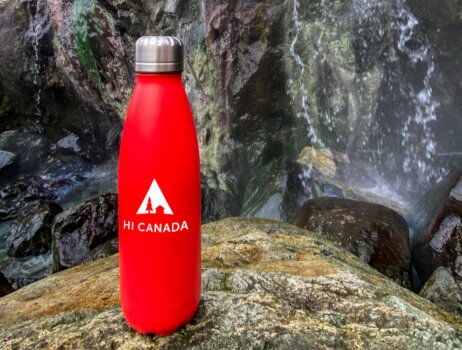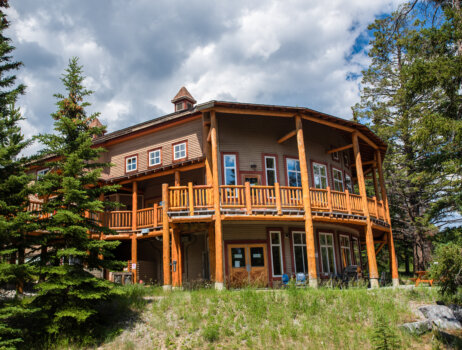For a Sustainable World
Left better than it was found.
The principles of sustainable tourism and HI Canada's not-for-profit status encourage us as an association to enhance the socio-cultural fabric of the community, minimize negative impacts on the natural environment, and harness our entrepreneurial spirit for the economic benefit of our communities around us.
In embracing these principles, HI Canada commits to:
- Accepting sustainability as our responsibility, thereby strengthening HI Canada today and for future generations;
- Measuring our actions towards sustainability and sharing those results through our channels of communication;
- Including socio-cultural, ecological and economic impacts when taking actions in the governance of HI Canada and the operations of its hostels.
How we're making a difference
We see the difference we make to the communities in which we operate by developing clear and measurable objectives in the following areas:
Ecological
We minimize our impact on climate change and ecosystems by understanding how our activities impact the natural environment, taking steps to intentionally reduce our impact and raising the ecological awareness of all.
Economic
We ensure that HI Canada, its regional Associations and their hostels are economically viable into the future and engaging local economies in collaborative ways.
Socio-Cultural
We ensure that our activities complement and advance the communities in which we operate by responsibly promoting their unique social, cultural and heritage characteristics.
HI Canada's environmental statement
Hostelling and a natural respect for the natural environment go hand-in-hand and HI Canada is a leader of environmental responsibility in the Canadian hospitality and tourism industry. Our environmental statement includes but is not limited to the following pillars:
Preserving Canada's Natural Heritage
We will reduce, and make continual progress towards eliminating, the release of any substance that may cause environmental damage to the air, water, the earth or people.
Eco-efficiency in Facilities, Products and Services
We will strive to change our consumption patterns by choosing cost-effective products and suppliers which eliminate, minimize or mitigate adverse environmental impacts.
Sustainable Use of Natural Resources
We will make sustainable use of renewable natural resources, such as water, soils and forests. We will conserve non-renewable natural resources through efficient use and careful planning.
Reduction and Disposal of Wastes
We will reduce, and where possible eliminate, waste through source reduction, re-use and recycling. All waste will be handled and disposed of through safe and responsible methods.
Risk Reduction
We will strive to minimize the environmental, health and safety hazards to our staff and volunteers, and to the communities we serve, or in which we operate, through safe technologies, facilities and operating procedures, and by being prepared for emergencies.
Information and Education
We will encourage our hostel guests to support the Canadian Code of Ethics for Tourists. We will keep hostellers, members, the Canadian public, and the international community, informed in a timely manner, of HI Canada's role in environmental stewardship.
Sustainability projects

HI Cumberland Goes Solar!
HI Cumberland is taking big steps toward sustainability with a 13.13 kW solar power system! These new panels will generate 12,000 kWh of clean energy each year, covering 30% of the hostel’s energy needs. That’s the carbon-saving equivalent of:
🚗 Driving 34,659 km less
🌳 Planting 143 trees and growing them for 10 years
⛽ Eliminating 3,585 L of gasoline emissions
Despite unexpected hurdles (like a 30-year-old roof that didn’t cooperate!), our team pivoted fast to make this project a reality. The result? A greener, more self-sufficient HI Cumberland that reduces its environmental impact—one solar panel at a time.

Encouraging the use of reusable bottles at all HI Canada hostels
It's no secret that humanity's got a plastic problem. Every second of every day, 1,500 plastic bottles are thrown away and 90% of these aren't recycled. To play our part in the fight against plastic, HI Canada will proceed in 2024 with the installation of refill stations distributing fresh and purified waters for guests to refill their water bottles. No bottle to bring on your hike? To encourage our guests to move away from plastic solutions, quality stainless steel reusable water bottles will be available at all the reception desks for purchase.

Helping local charities at HI Whistler
HI Whistler pledges to serve its local community by transforming both HI Whistler and Cheaky’s Cafe into a central gathering place for all local non-profit and charitable organizations. Through a strategic partnership with the Whistler Community Foundation, HI Whistler will provide complimentary meeting spaces for the Foundation and its affiliated non-profits and charities within the region to contribute more effectively to building a stronger, more cohesive Whistler community.
Off-Grid Fridges at HI Rampart Creek
We're nothing if not resourceful. Two hostel managers in the Rockies got together and came up with a plan to convert recycled chest freezers into 'hybrid refrigerators' that harness the cold Canadian winter air to refrigerate food. In the summer, they're powered by solar panels. As a result, the hostel uses 1,400 fewer litres of propane per year.
Harnessing the sun at HI Athabasca Falls
In 2016, HI Athabasca Falls Wilderness Hostel officially went fully off the grid with the installation of 15 solar panels, bidding a cheerful "smell ya later" to their old diesel generator. The solar panels provide 100% of the hostel's electricity in the summer months and reduce the hostel's greenhouse gas emissions by a whopping 88%.
Protecting biodiversity at HI Vancouver Jericho Beach
HI Vancouver Jericho Beach is located in beautiful Jericho Park, which is home to a number of rare plant and animal species. Hostellers can help protect biodiversity in the area by taking part in our Earth Easy Project. Donations are given to the Jericho Stewardship Group to fund replanting and the building of bird and bat boxes in the park, and hostel guests can also volunteer to help remove invasive plants while also replanting natural plants.
Turning water into electricity at HI Yoho National Park
Thanks to support from the HI Sustainability Fund, HI Yoho National Park, Whiskey Jack Wilderness Hostel installed a micro-hydro electrical power generator in 2015, which brought electricity to this remote hostel for the first time ever. The generator uses flowing water from a nearby stream to power the hostel's lights, fridge and communications, while also giving guests a glimpse of renewable energy in action.

Reducing clothing waste at HI Calgary
HI Calgary pledges to donate unclaimed clothing left behind by guests and old linen from the hostel to people experiencing homelessness situations. Rather than letting these items become textile waste, we've partnered with local shelters (Drop-In & Rehab Centre Society, Mustard Seed, and Centre of Hope) to ensure they reach those in need. This program not only minimizes waste but also fosters a sense of community among our guests and contributes to addressing homelessness in our community. We estimate to donate 600 to 800 pounds of clothes per year, starting in 2024.

Donating and repurposing duvets at HI Penticton
HI Penticton pledges to donate and repurpose the hostel's duvets that will be replaced in 2024. They will be donated to various charities, such as the Compass Court that helps the the people of Penticton experiencing homelessness situations, as well as the South Okanagan Women In Need Society (SOWINS) and the Okanagan Nation Transition Centre that provides emergency shelter for women. There will be also be a few donated to the Penticton SPCA to provide comfort their animals.

Reducing paper waste at HI Jasper
Paper waste represent up to 40% of all the waste generated by the hospitality industry - that's why HI Jasper pledges to reduce its paper usage in 2024 through a simple but effective strategy: saving front desk documents online instead of printing them. This will save about 1460 paper sheets compared to what was printed in 2023 - and this is just the beginning! HI Jasper will conduct a thorough review of its processes to minimize its paper usage across all its operations.

Birthday calls at HI Calgary
To foster connection and combat isolation and loneliness within the Calgary community, a heartwarming initiative has emerged at HI Calgary in partnership with the Senior Resource Society: reaching out to seniors through birthday calls. HI Calgary allocates time for its staff to call local seniors on their birthday and engage in conversations with them that extend beyond celebratory moments. In 2024, we estimate that there will be about 30 to 50 of these birthday calls.

Reducing electricity consumption at HI Penticton
HI Penticton pledges to reduce its electricity consumption and its carbon footprint by implementing motion lights in the men's bathrooms. That initiative will ensure that the lights are never left on after someone uses the facilities. Even if about 87% of electricity in B.C. is produced from hydroelectric sources, which are renewable, it doesn't mean we should be wasting it!

Welcoming seniors at HI Vancouver Downtown
HI Vancouver Downtown is committed to enhancing its ties with the community by forming a partnership with The West End's Men's Shed. This collaboration will provide free meeting spaces to a group of young at heart community members engaged in crafting DIY kits from recycled wood for making dulcimers. Subsequently, the hostel will host small gatherings of adults and children to assemble these dulcimers together, which will then be gifted to local educational institutions.
HI Canada in the Community
Here are a few more ways that HI Canada and its hostels have been making positive changes in the communities where we operate.







